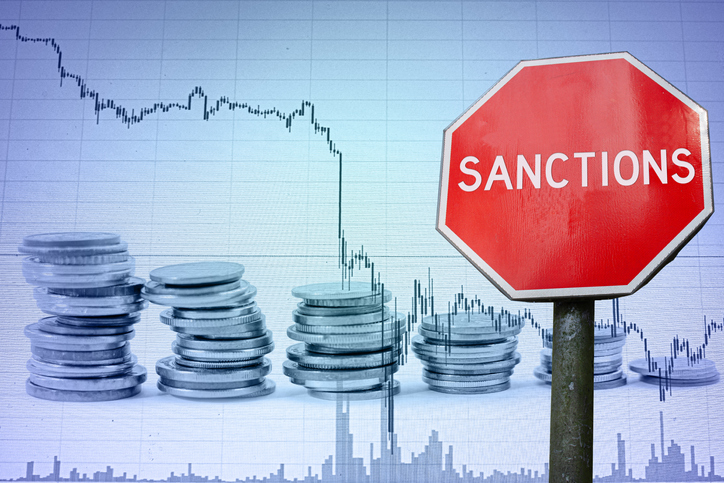Centralized Sanctions versus Crypto and Decentralized Assets
The very first sentence of Bitcoin’s whitepaper proposes a purely peer-to-peer version of electronic cash that would permit online payments to be sent from one party to another without any intervention from a financial institution.
Investopedia also describes cryptocurrency as a virtual digital currency secured by cryptography, making it nearly impossible to counterfeit or double-spend. Many cryptocurrencies are decentralized networks built on blockchain technology—a distributed ledger implemented by a disparate network of computers.
Therefore, a key defining feature of cryptocurrencies is that they are typically not issued by a central authority, making them theoretically immune to government interference or manipulation.
However, the recent U.S. sanctions on trades with Russia have raised some real questions about the value and viability of cryptocurrencies in the face of centralized restrictions.
What are Sanctions?
Sanctions are powerful tools that the United States and European countries use to influence the behavior of nations that aren’t considered to be their allies.
Since the U.S. dollar is the reserve currency of the world and is used in payments worldwide, the United States has even more agency to use sanctions as a diplomatic tool.
How do sanctions work?
A government that wants to apply sanctions first makes a clear list of people and businesses that its citizens should avoid. Then, anyone found engaging with a member of that list would face heavy fines and penalties.
The key to an effective sanctions program is the enforcement responsibility of the global financial system. Banks across the globe monitor where the money comes from and where it is bound. The anti-money-laundering laws require them to block transactions with entities that are under sanctions and report their findings to the concerned authorities.
However, if banks are the enforcers of the governments’ rules, then digital currencies are growing to become the rulebreakers of today’s world.
American government officials are becoming increasingly aware of the potential that cryptocurrencies have to reduce the impact of sanctions.
How do the sanctions on Russia affect centralized and decentralized finances?
In 2014, the U.S. had banned Americans from conducting business with banks, gas and oil developers, and other companies in Russia after the country’s invasion of Crimea. These Western-imposed sanctions hit Russia’s economy swiftly and immensely, with an estimated impact of $50 billion a year.
Ever since, the global market for cryptocurrencies and other digital assets has grown exponentially, which is bad news for the enforcers of sanctions, but good news for Russia.
More recently, the Biden administration has enacted fresh sanctions on Russia due to the conflict in Ukraine. These sanctions aim to thwart Russia’s access to foreign capital.
Digital currencies have been cited as the means to bypass the control points, like bank transfers, that governments rely on to block deal execution.
How are cryptocurrencies being used to evade Sanctions?
For a while now, both Iran and North Korea have been using cryptocurrencies to evade sanctions. As a result, many tools have been designed to hide crypto transactions even more than they are by default.
- Crypto transactions are anonymous in the sense that one can hold a crypto address without revealing anything about their identity in that address. Furthermore, one person can hold multiple addresses, and therefore, there would be nothing to link those addresses together or indicate the specific person who owned them.
- Decentralized finance (DeFi) exchanges have been developed to process financial transactions independently, thereby subverting the control of centralized financial organizations like banks.
- Blockchain intelligence firms like Chainalysis and Elliptic have been creating sophisticated blockchain tracking tools based on the fact that transactions on the Bitcoin blockchain — and most others — are public. They rely on tracking these transactions to identifiable wallets used in the past (unlikely to be possible with state-level sanctions evaders) or by following transactions to the off-ramp required to convert crypto into fiat currency for buying things. However, crypto mixing services and privacy coins like Monero have also been designed specifically to overcome these blockchain tracking tools based on the fact that blockchain transactions are pseudonymous — the identity of the crypto owners are hidden.
- There are also direct, peer-to-peer transactions that are simply private and do not need to go through an exchange at all. Moreover, there is significant liquidity in the Bitcoin market alone to fulfil Russia’s needs. According to New York Digital Investment Group, Bitcoin’s transaction volume surpassed $3 trillion last year, which could be a result of Russian Bitcoin holders liquidating their assets.
Are sanctions being enforced efficiently Enough?
- S. exchanges like Binance US, Coinbase, and FTX will have to abide very closely by sanctions under the U.S. Treasury’s OFAC regime as OFAC sanction violations come with a jail term of up to 30 years. However, other internationally-based centralized exchanges will have more or less freedom depending on where they are based — many are located in small, offshore jurisdictions with strong banking secrecy.
- The transaction volume of DeFi exchanges is growing rapidly as they do not need — or have — anti-money-laundering (AML) tools to identify customers. At least, in theory, these exchanges have no employees or owners that law enforcement bodies can pursue or penalize.
Closing Thoughts
Considering that cryptocurrencies are, by definition, unaffected by centralized control, it seems quite impossible for governments to impose their centralized sanctions on the use of cryptocurrencies and other decentralized assets.
The fact remains that cryptocurrencies are being used to evade U.S. sanctions on transactions with Russia. If the authorities wish to enforce the sanctions more efficiently, they are against the core principles of cryptocurrencies and decentralized finance.
The question is, which will prevail?
Centralized sanctions or crypto and digital assets.



